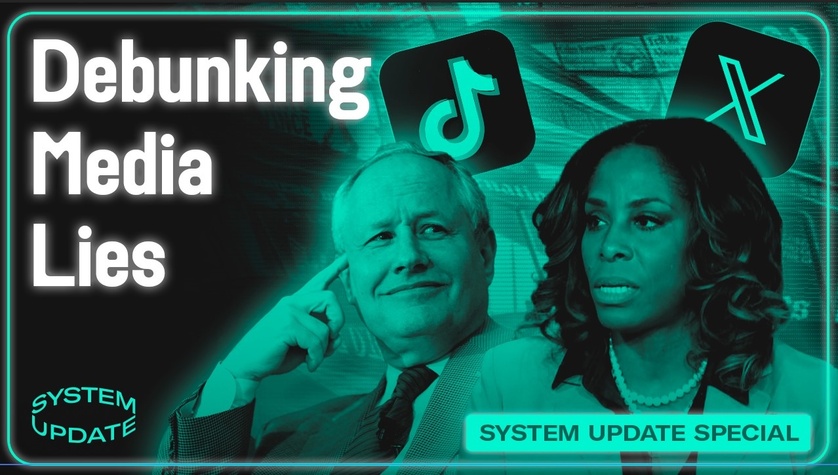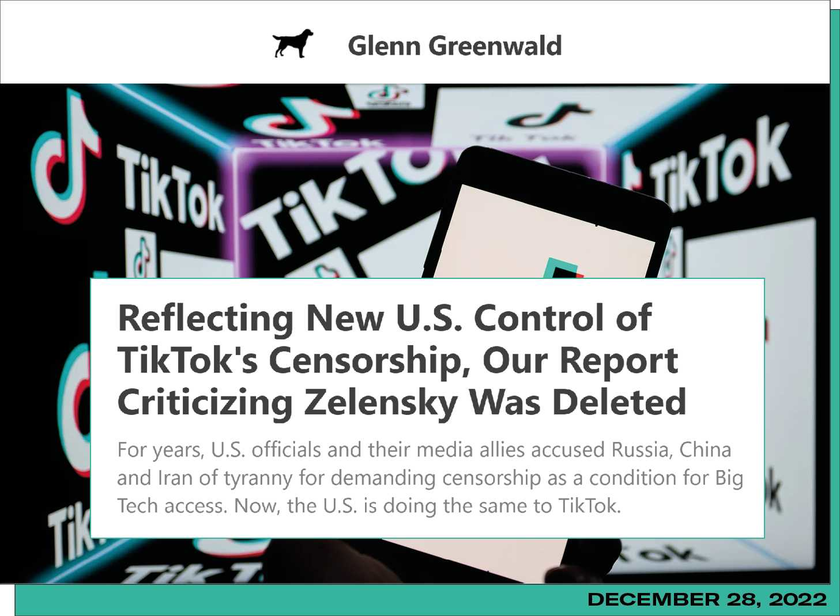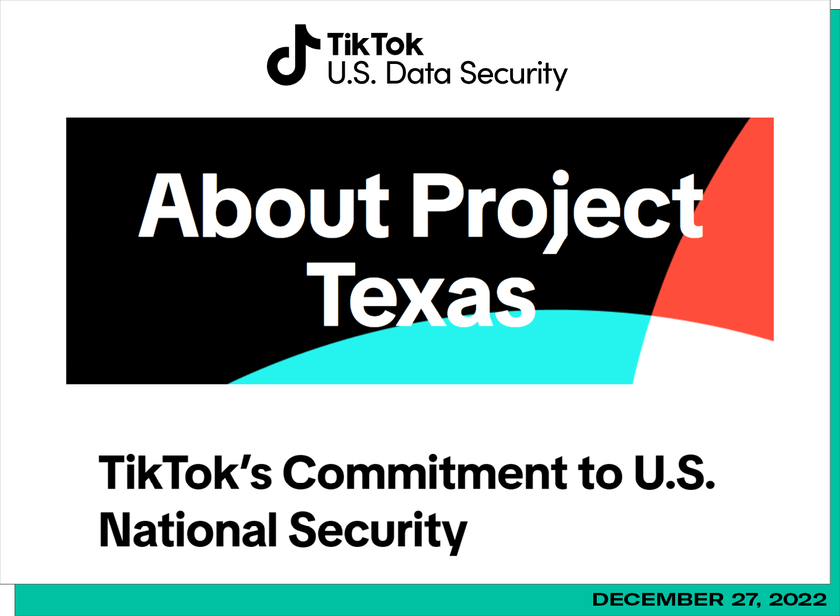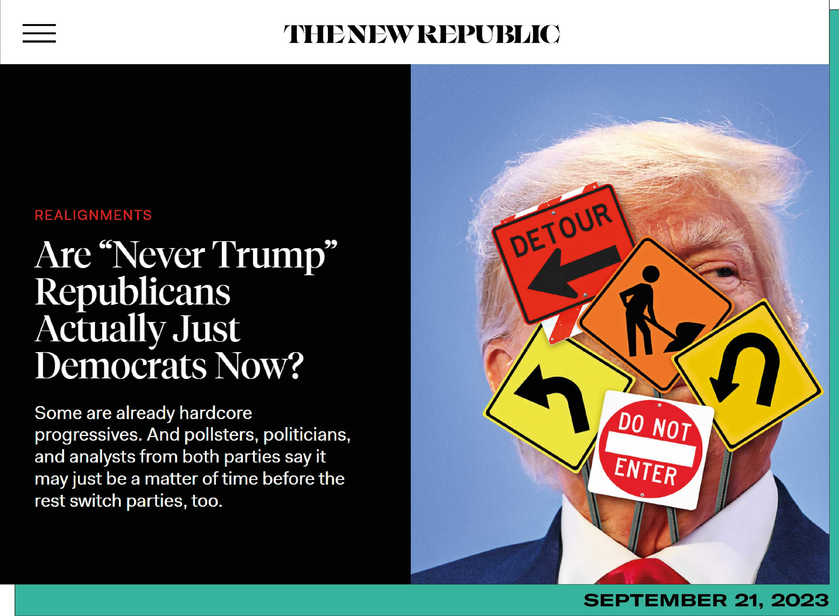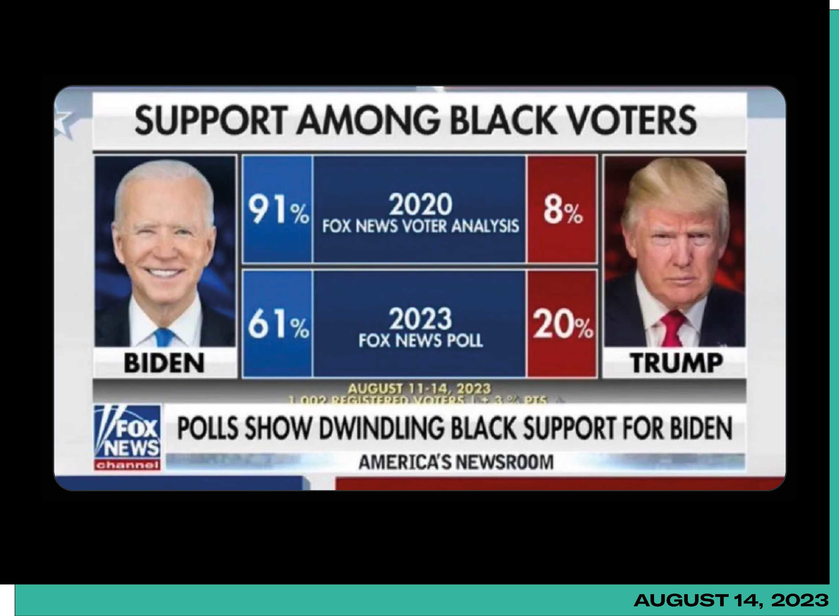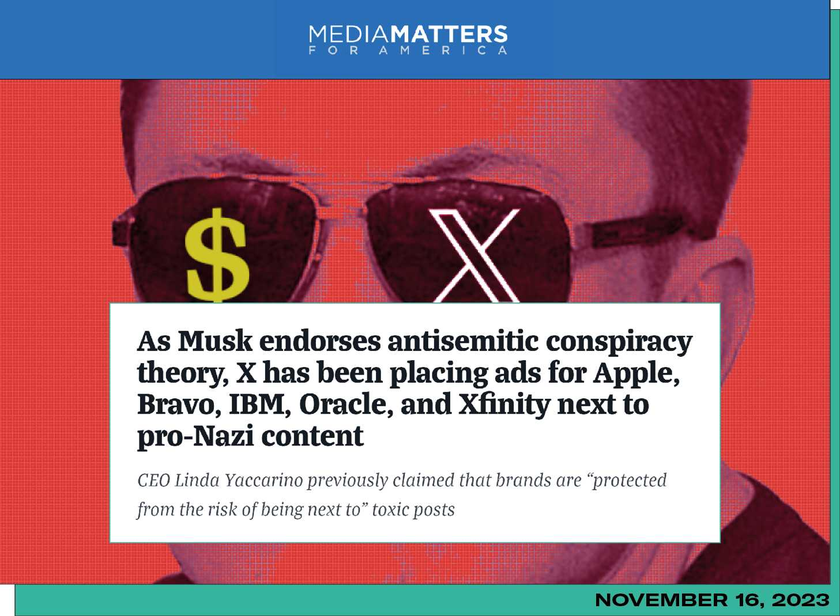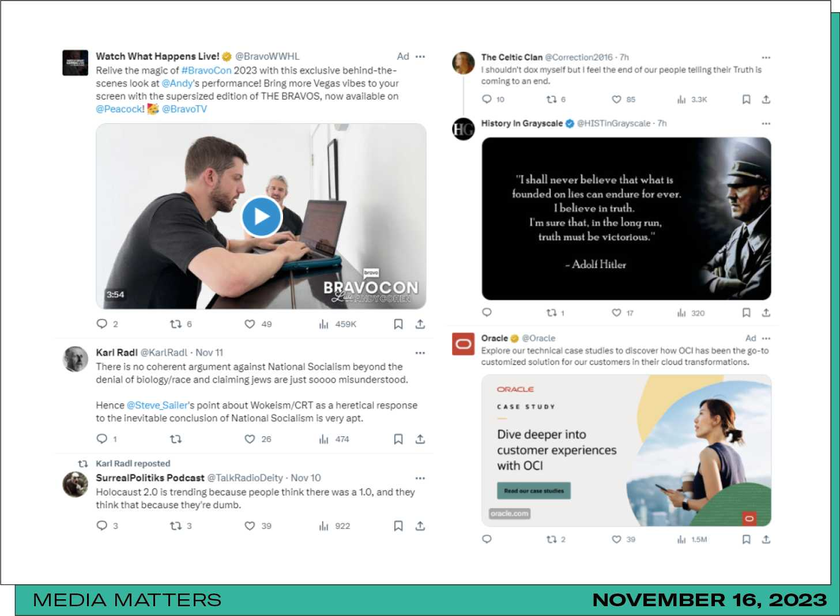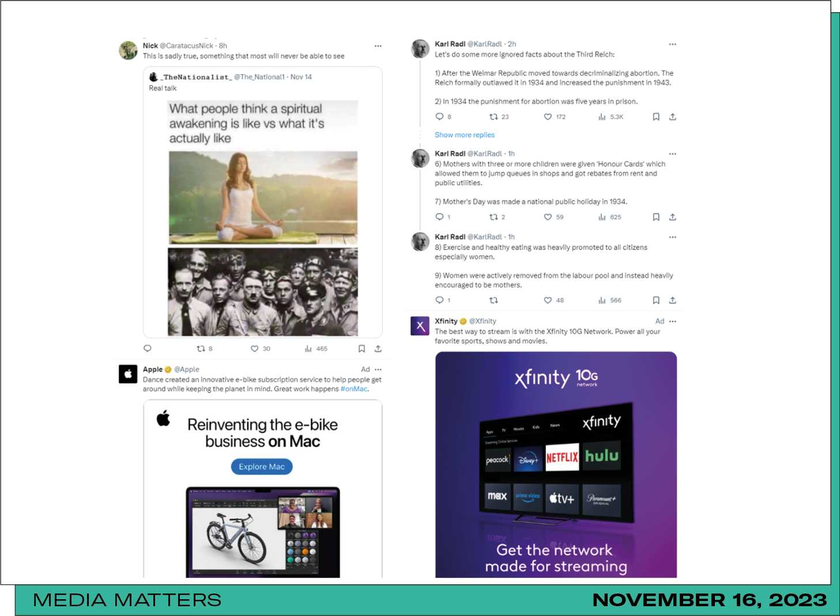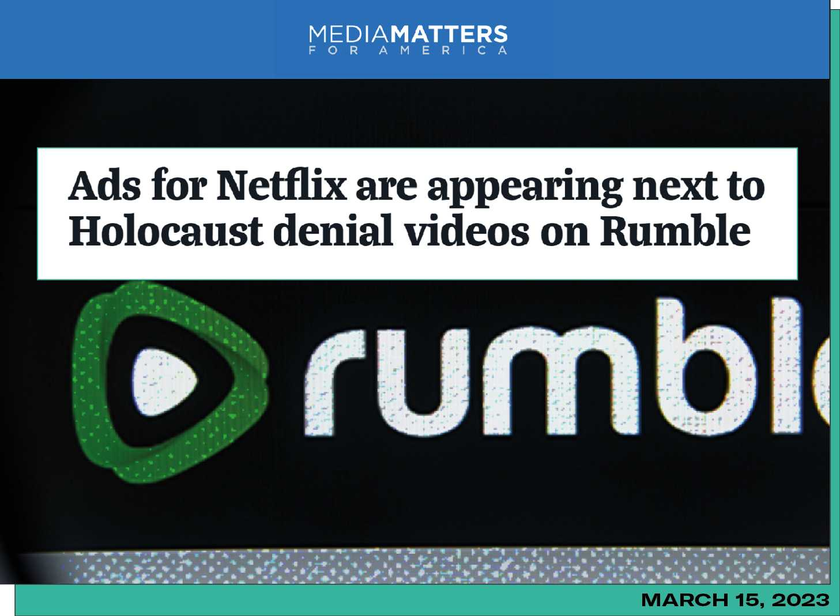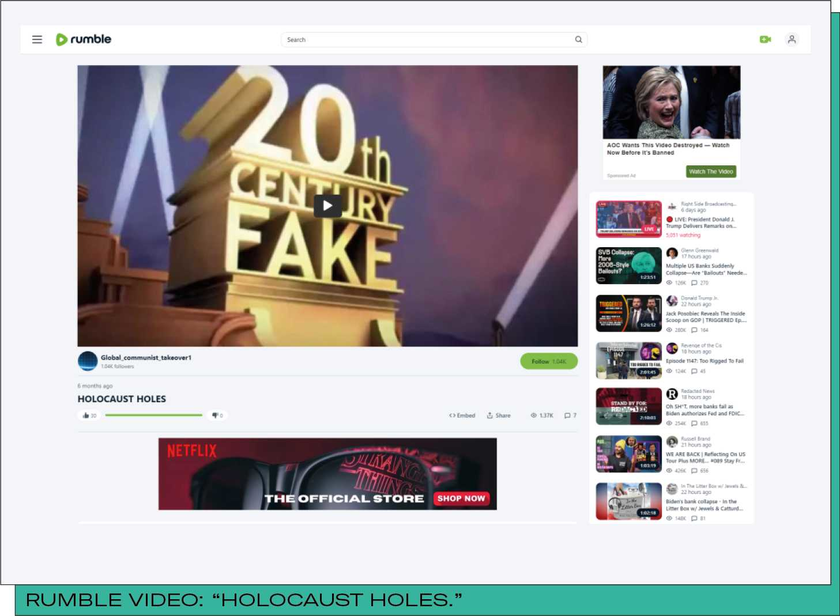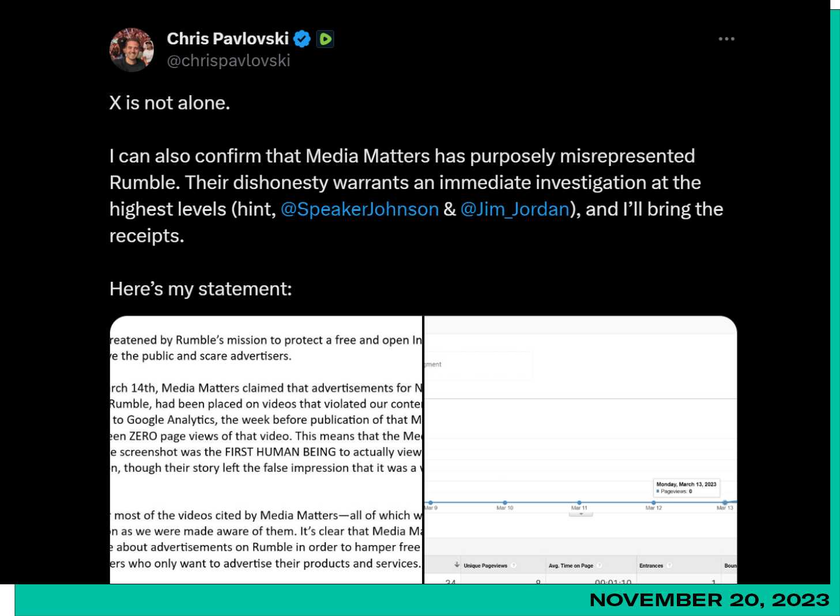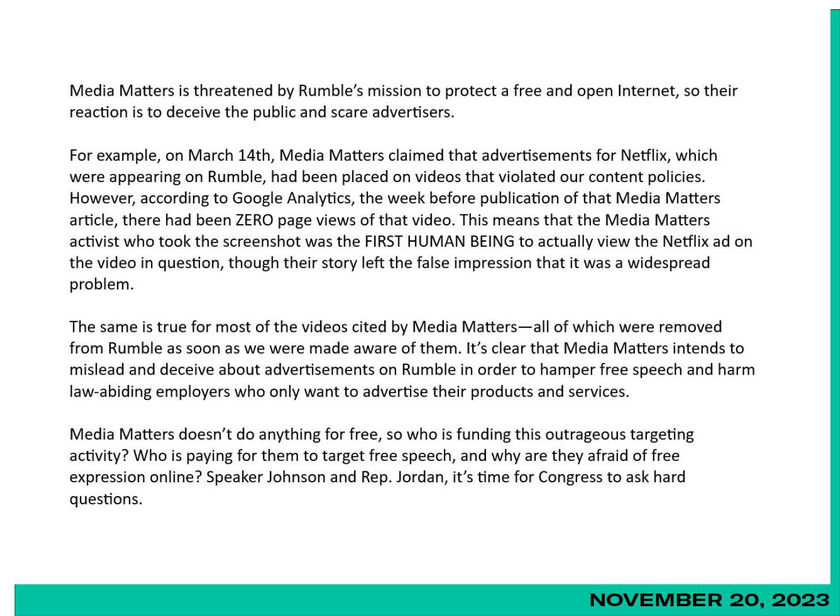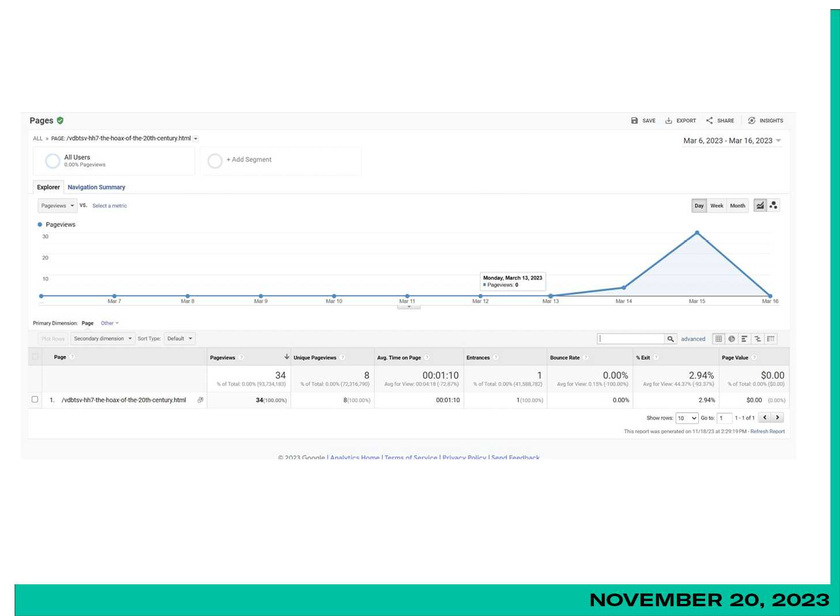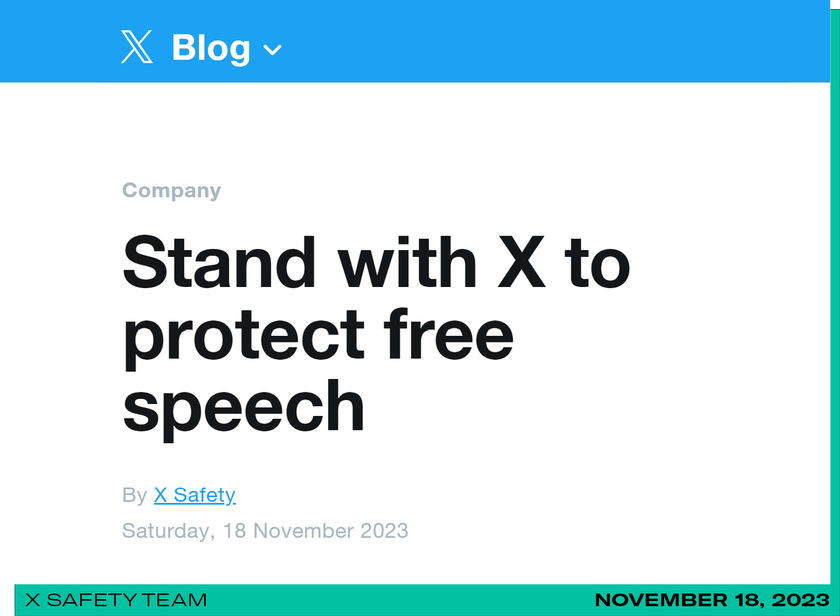Watch the full episode HERE
System Update Retrospective: Watch Glenn tackle some of the most pernicious lies in American politics, from slander about TikTok to propaganda about the current conflict in Ukraine.
Interview with Darren Beattie Regarding J6 Tapes
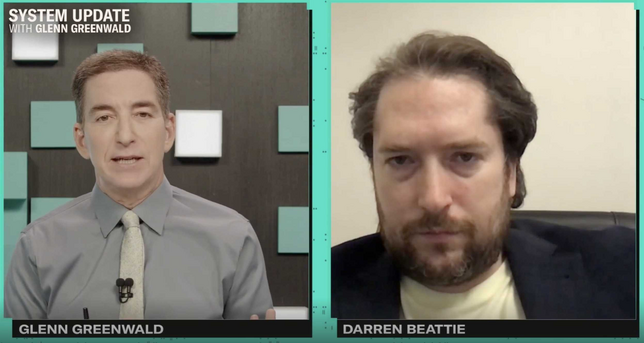
[Originally streamed on November 20, 2023]
Watch the clip.
Read the original transcript.
G. Greenwald: So, let's dive into this new release of January 6 tapes. This was something that a lot of the people who were opposed to Speaker McCarthy were enraged by the fact that he did under a lot of pressure release these tapes to Tucker Carlson for Tucker Carlson and Fox to go through and report on, but he never made them all public. It was one of the promises they extracted from Mike Johnson when they decided to make him a speaker. He made good on that promise very quickly. In the last 48, 72 hours, he released a whole bunch of new January 6 tapes that nobody had ever seen before. It’s the first time the public gets to see them all. I just want to give viewers who haven't seen it a kind of taste of just one of the videos that show people coming into the Capitol not violently, not having to fight their way through, not being stopped by the police, but actually welcomed by the police and marched through the Capitol quite peacefully. Let's take a look at this video.
You don't really obviously hear any audio, of course. But for people listening by podcast, you have these police officers standing on the side. You have Trump supporters who are marching into the Capitol. They're not in any way engaging in any violence. They're not being stopped. The police seem to be shepherding them in, escorting them in, walking them in. They're being very peaceful. They're walking slowly, walking without having to fight anybody. Some of them are just taking videos. It's a very kind of tranquil scene.
So, Darren, let me ask you about this video and the new videos we've seen. Obviously, we did learn a lot when Tucker Carlson finally got his hands on them and was able to show us these videos. But before we get into the content of them, just talk about the process, like when the January 6 committee existed. We saw only the tapes and excerpts that Liz Cheney, Adam Kinzinger, Adam Schiff and Bennie Thompson wanted us to see. And they hid everything else. What does it say that it took this long? Two and a half years, almost, almost three full years, to be able to have the public see all the videos, not just the videos they wanted us to see.
Darren Beattie: There's been a severe reluctance on the part of the mainstream media and the regime to allow the public to see any direct footage of January 6 that could complicate or contradict the official narrative that's been shoved down our throats every day for years now. And that narrative is that January 6 is some sort of horrific, unique event of domestic terror that exceeds even 9/11. And I think Biden even said, at one point, exceeds the civil war in terms of the trauma that was inflicted on the country. They've invested a tremendous amount of money, resources and intention in crystallizing that narrative because it's used as the pretext to further the weaponization of the national security state against the American people. So, there's a lot riding on it. And anything that challenges that narrative – certainly I've experienced directly because Revolver News is at the forefront of challenging various aspects of that official narrative – and so this footage is in that vein. I think anyone who's paid close attention to the issue already knew that the Capitol Police provoked the crowd gratuitously with flash bangs and so forth. Anyone paying attention would have already known that the Capitol Police in many instances opened the doors to the crowd and so forth. But developments such as this, where the footage becomes more widely available in that scale, like the full range of footage, is very important because it reinforces the understanding that's already been out there by some of the research like we've been doing, Julie Kelly and others. And it allows the public to understand what happened – and to the public that hasn't paid much attention to it. So, I think it's very significant that this came out for a variety of reasons. And my understanding is there's going to be still more footage. So, a lot of people who may not have paid attention to it, see this video and they say this is not what they've been telling me every day for years now.
G. Greenwald: You know, the amazing thing, too, is the role of the media. As you say, the media paid enormous amounts of attention to January 6. You could argue it's one of the 2 or 3 top stories to which they paid attention for obvious reasons since it happened. Usually when there's material that the government has relevant to a story the media is covering one of the duties of the media is to insist on transparency, to press for it, to ask for it, to complain that the government's not releasing it, and then ultimately to sue under Freedom of Information Act or other kinds of provisions that force the government to release it. That's one of the jobs of journalists by definition. And we're talking about this last week, in the context of the shooting, the mass shooting at that Christian school by that trans woman who wrote a manifesto – killed six people, three of whom are nine-year-old students, the others were 60-year-old teachers – who left a manifesto. Usually, the media feeds on these manifestos and wants to get their hands on them so they can figure out what conservative pundits or politicians to blame for having caused the violence, to claim that the people that were radicalized by this person or that person. And in this case, we haven't gotten the manifesto for 7 or 8 months, then the National Police Department, the FBI have had all sorts of obviously pretextual reasons why they can't release it, including claiming there's an ongoing investigation still to determine if there was a coconspirator. When everybody knows this person acted alone, there's nothing to investigate. They just don't want this leaking. And then we finally got a few pages through Steven Crowder and immediately Big Tech banned it from even being discussed. And in this case, you had almost nobody in the media doing things like retaining counsel. We retained counsel and national by that point. There were other lawsuits already pending and they just told us, you can repeat it, but, you know, these officers are going to make it through the courts and now they are. But the same thing happened here with January 6. A much bigger story there. I don't think any media outlets were trying to pressure the government to release the footage. Why do you think that is?
Darren Beattie: Well, it depends on what kind of pressure you mean. I think there are a lot of people who have been saying the full range of footage should be released to the public and not undergo any kind of process of mediation […]
G. Greenwald: I'm sorry. Just I'm sorry. I meant media corporations, like large media corporations, like The New York Times, ABC, CNN have not been suing, have not been demanding. That's all I meant. Yeah.
Darren Beattie: Right. Well, I mean, their vested interest is basically in the narrative that they'd already been promoting and I suspect that they did have access to it, and based on that access, they selectively presented the footage that best solidified their narrative. And what's ironic about that is, for instance, there was a very carefully curated video montage for a short documentary thing The New York Times did call January 6 “Day of Rage,” in which in their full range of footage, they selected the clips that most darkly and ominously suggested a preplanned attack on the Capitol. And guess who appears not once but twice in this short montage? It’s none other than Ray Epps. So, before The New York Times’ release, publishing fully dedicated puff pieces to Epps, they thought that his participation was so egregious that in the mountains of footage they had access to, it warranted two appearances in their montage, designed to portray the narrative that this was a pre-planned event of domestic terrorism. So, there's a lot of interesting twists and turns when you look into it, for sure.
G. Greenwald: And I want to ask you about Ray Epps in a second. That was something I was planning on asking you about, and I want to get to that in a minute but before we get to that, there was violence on that day. There were clashes between protesters and police, as we've seen in so many protests at various times over the last, say, a couple of decades in the United States. And well before that, I mean, in the 60s, there used to be these kinds of protests all the time where protesters and police would fight against each other. So, there was violence. There were some clashes between protesters and police, and police ended up injured. But what if these clips that we hadn't seen until just now, things like them entering the capital without any attempt to stop them, what did they show us that narrative that we've been fed excluded?
Darren Beattie: Well, and again, we've already seen this type of footage, but it simply reinforces the fact that in the overwhelming majority of cases were people who had been let in or went in largely unopposed, who weren't disruptive, did not destroy any property, did not assault any officers, and just kind of went with the flow of what must have been a very surreal experience of kind of people just rolling through the Capitol and sort of taking pictures and marveling at how bizarre the whole experience was. And then they're out of the Capitol five minutes later, in many instances. Then the next thing they know, they're treated like Osama bin Laden. And I think that's the story of a lot of people who just kind of got caught up in the crowd psychology but then if the crowd is going in, the cops aren’t opposing, and in many cases, they're opening the door and fist bumping people and chatting with people and so forth, you don't really register that you're putting yourself in a position of a future domestic terrorist. And then you, you know, you mosey on through for five minutes, take a few pictures, text your relatives, “This is crazy. I'm in the Capitol” and then you leave. And then the next thing you know, your entire life is ruined and turned upside down. So, I think the video footage kind of reinforces that reality and helps us to understand how that could be the case. As for the other aspect of the footage on the outside of the Capitol, it shows again, these gratuitous actions of provocation from the Capitol police, in the flash bangs and things like this, that really provoke the crowd. And I think a lot of the violent behavior we saw on the part of the crowd was actually agitated and precipitated by these actions of the Capitol Police that may or may not have been given the green light from above.
G. Greenwald: Yeah, to this day, it amazes me, you know, that of all the people charged and prosecuted in the January 6 cases, a small percentage of them were accused of using violence, the vast majority of them, the state acknowledges, the government acknowledges, did not, in fact, used violence. And yet we watch people convicted of nonviolent protest crimes like the QAnon, for example, who went to prison for a long time, for years, people got prison sentences of years or many months of pretrial detention, even though they were never accused of any violence. And it's unbelievable to me to watch left liberals cheer and applaud and support not just the prosecution, but the imprisonment of nonviolent protesters, political protesters, given the precedent, then this has created the sorts of things they've always said.
All right. Let's talk about your friend, Ray Epps. We've talked many times about him on this show. You've been elsewhere talking about him. Other conservative journalists and pundits have spoken about him raising questions like he seems to have played a very central role in a lot of these events. You see him on video, as you said, The New York Times featured him twice, thinking he was a pretty important person. He was on tape really provoking people to storm the capital, to use violence, revving them up. And yet, of all these people that we just talked about went to prison, Ray Epps never did. And it raised the question of why that was. He insisted he had never worked for the FBI and threatened to sue people. I think he now has sued a couple of people, including Tucker Carlson, who insinuated that he might have worked for the government. He now has been charged, he pled guilty to one misdemeanor account. I don't believe he got a prison term, or if he did, it was very short. Does the fact that he's now finally been charged and pled guilty change your mind about some of the questions surrounding him?
Darren Beattie: No, not at all. I mean, it seems like a very desperate attempt to patch things up, but it's too little, too late. You know, you can't wait over two years after all is said and done and then slap him with a misdemeanor charge that doesn't even match the same charging of other people who've gotten misdemeanors, let alone obstruction of official proceedings, a felony – and there are so many other charges available to the Department of Justice. They wanted to use them. They didn't have to wait this long. And they could have very easily given him much more severe charges. And of course, they don't have to. But the manner in which they exercised prosecutorial discretion is very telling because very early on, a guy named Michael Sherwin, who is in charge of these prosecutions, who advocated infamously a shock and awe approach to arresting as many people before Biden's inauguration, he, I think, reasonably stated that, look, we're going after the conspicuous cases, the cases of people like the Q shaman who are kind of publicly flouting us, the more visible cases where the ones that they wanted to exercise their prosecutorial discretion make an example of. And Ray Epps was among the most visible, if not the most visible. He was one of the first 20 people put on the FBI's most-wanted list. As I mentioned, of all the footage, The New York Times could have chosen to reinforce their ominous narrative, they chose Epps and they chose him for a reason. He was a very public figure with a sort of made-for-TV, made-for-virality moment, saying ‘We need to go into the Capitol.’ A former Marine in camouflage with a Trump hat telling the crowds to go into the Capitol, who, by the way – people forget this – was the former head of the Arizona chapter of the Oath Keepers, the most demonized and heavily prosecuted militia group Sochi of January 6, other than arguably the Proud Boys. So, with all of this stuff on paper, he would be exactly the kind of person they'd want to make an example of. They had very easy indictments on him from the very beginning. And not only did they wait over two years to do a sham misdemeanor, which they warned him about in advance, in contrast to all the other people who've gotten the Swat treatment of, you know, the guns bursting down the doors at three in the morning, they just said, “Oh, by the way, we want to inform you you're going to get a misdemeanor charge now or two years later.” And by the way, this charge fits into the theory of these ridiculous defamation suits that he has. So, it's all so convenient for him. So, the short answer is no. I don't think a misdemeanor charge over two years after the fact changes anything but underscores how desperate the regime is to tie up loose ends when it's too little, too late.
Just to tie in quickly to something you were talking about earlier in your monologue, just guess who Ray Epps’ lawyer, his representation for these defamation cases is. Guess who he's worked for and he works for now.
G. Greenwald: Is it Media Matters?
Darren Beattie: None other. Well, not quite.
G. Greenwald: David Brock.
Darren Beattie: Yeah. So, the fact that now David Brock is in the orbit of Epps as indirectly supporting Epps’ defamation suits, which at least until now, are technically just against Fox News, not against Tucker or myself. Well, we feature within the defamation suit. But yeah, it's, it's pretty remarkable that a lawyer that worked for David Brock who is of the law firm Perkins Coie, which in a variety of contexts sits at the intersection of the Democrats and the national security state, that this should be the individual to represent Epps. I don't know whether Epps actually has to pay for them or whether it's pro bono or something else but [..]
G. Greenwald: But I'd be shocked – and you're right that this is a major law firm in Washington and elsewhere. They played a major role in the interaction with Russiagate and the Democrats and the security state with Democratic Party voting suits of all kinds. It's an extremely expensive firm. I seriously doubt Epps can pay for it. The way Ray Epps has been turned into a probable cause. Every single other person in January 6 has been talked about as a Satanist, as you said, is like almost a member of al-Qaida or worse. And yet the media has defended Epps so vigorously, as have Democrats from the very beginning. They went so out of their way to be able to charge everybody there with felonies we've talked about before and the way they had to stretch these precedents, use this Sarbanes Act – that was really designed to punish people who had done things like impede the Enron investigation by trying to turn this into some sort of interference with an official investigation – to turn it into a felony, something that that law had never intended to cover before. And yet they went out of their way to make sure Ray Epps got charged with the misdemeanor, even though his involvement was so much greater, as was reflected by the fact that The New York Times is featuring him, as you said.
Who Does TikTok Really Serve?
Watch the clip.
Read the original transcript.
I'd be willing to bet a lot of money that there are a lot of you who believe that TikTok is controlled by the Chinese Communist Party, that the censorship or content moderation decisions they make are designed to manipulate young Americans into hating their government and fighting with one another, just like we were told the Russians do. We're constantly told the Russians are trying to infiltrate social media to turn us against each other, to create division. That was for a long time. The reason more social media censorship was needed to prevent the scary Russians from dividing us – now they've added China to it. Knowing that a lot of people aren't afraid of Russia, that the Russiagate hoax proved to be a fraud, they've now switched the fearmongering to China, and I know there are a lot of people who opposed the war in Ukraine, the U.S. role in the war in Ukraine, who know now Russiagate is a fraud, who say, no, Russia is not an enemy. China: that's who we really have to be afraid of.
What happened was I actually did a lot of investigation and research into this because I wrote about it, in December 2022, when I was still at Substack.
What happened was we produced a segment on our show here that was very critical of the Ukrainian government and the war effort of the United States in Ukraine. And it went pretty viral. A lot of people were spreading it around and watching it. Then, suddenly, very quickly, it got banned, and taken down by TikTok which sent us a note saying this video is a violation of our terms of service. And of course, I thought to myself, okay, I kept hearing that China censors to propagandize Americans against their government, so why would they want to delete my video – critical of the U.S. government? Why would they want to protect the U.S. government from my criticism of it? Why would they want to protect the U.S. government's war effort in Ukraine by banning critiques of it? That doesn't make any sense, does it? Just like it doesn't make sense that TikTok banned mention of the bin Laden letter. And we went in, investigated what actually was going on.
It turns out that – and I'm going to show you the evidence and you can make your own decision –that the CIA and the FBI have taken the position they wanted TikTok banned. The people who own TikTok, who are the founders of TikTok, the main founder in particular, is someone who was born in Singapore. He went to the London School of Economics. He then went to Harvard Business School. He's a capitalist. He's trying to get wealthy. He's getting rich. He's the founder of TikTok. And the U.S. is an incredibly lucrative market for TikTok. But they don't want to lose access too, because it would cost them billions of dollars in valuation of their company. They're now trying to compete with Amazon and have e-commerce on that site. It's a gold mine. And so, they're desperate not to get banned from the United States. And so, they've told the CIA and the FBI, look, we don't care about political censorship. We'll turn that over to you. We'll let you tell us what you want censored for us to stay in the United States. And that is what's been happening.
The U.S. security state has been gradually commandeering the ability to content moderation on TikTok as a condition for allowing TikTok to remain in the United States. So here is the article we wrote.
For years, U.S. officials and their media allies accused Russia, China and Iran of tyranny for demanding censorship as a condition for Big Tech access. Now, the U.S. is doing the same to TikTok. (Glenn Greenwald, Substack, December 28, 2022)
That's China and Iran and Russia. Do they say, hey, Google and Facebook, you can only come to our country if you agree to censor as we command. That's what Brazil is doing as well to Facebook and Google and Twitter. We'll let you be in our country, but only if you censor as we demand on Facebook. Google and Twitter want access to the Brazilian market. It's a huge market. And so, they censor what the Brazilian government tells them to. Elon Musk had a controversy because right before the Indian election, the Indian government told Twitter, we want all these accounts banned and Elon Musk banned them. And when he was criticized over it, he said, well, look, I'm not going to lose access to India, a gigantic democracy, of course, I'm going to censor, as the government tells me to. If the threat is if I don't, I'll be banned from their market. That's what the United States is doing to TikTok: it's telling them we're going to ban you from our country unless you censor the way we want. We know that the United States government is very interested in controlling the flow of information on Big Tech. That's what the Twitter Files were about. They were doing that with Facebook and Google and Twitter. And of course, they're doing that with TikTok as well.
Concerns over China's ability to manipulate U.S. public opinion were based on claims that China was banning content on TikTok that was contrary to Beijing's interests. Western media outlets were specifically alleging that the Chinese government itself was censoring TikTok to ban any content that the CCP regarded as threatening to its national security and internal order.
Rather than ban TikTok from the U.S., the U.S. Security State is now doing exactly what China does to U.S. tech companies: namely, requiring that, as a condition to maintaining access to the American market, TikTok must now censor content that undermines what these agencies view as American national security interests. TikTok, desperate not to lose access to hundreds of millions of Americans, has been making a series of significant concessions to appease the Pentagon, CIA and FBI, the agencies most opposed to deals to allow TikTok to stay in the U.S.
Among those concessions is that TikTok is now outsourcing what the U.S. Government calls “content moderation” — a pleasant-sounding euphemism for political censorship — to groups controlled by the U.S. Government: “TikTok has already unveiled several measures aimed at appeasing the U.S. government, including an agreement for Oracle Corp to store the data of the app's users in the United States and a United States Data Security (USDS) division to oversee data protection and content moderation decisions. It has spent $1.5 billion on hiring and reorganization costs to build up that unit, according to a source familiar with the matter.” (Glenn Greenwald, Substack, December 28, 2022)
TikTok has been hiring away from Facebook, from Instagram, all their security state executives who had overseen censorship for Facebook and for Google and putting them in charge of content moderation in TikTok to show the U.S. government we're going to censor the way you want, just like Facebook and Google do, as a condition to allowing us access to your market.
Keep an open mind on this whenever government officials start trying to scare you and then in conjunction with it, say, now that we put you in fear of China and what they're doing on TikTok, give us the power to censor what your kids can and can't hear or what adults can and can't hear. Be open-minded to what actually is happening at least.
It was the White House that first demanded TikTok be banned. It was Karine Jean-Pierre, White House Press Secretary, who did so in March of this year, and when she did, a TikTok user named Luke David Johnson produced a video – he's a prominent TikTok user. He's not a child. He's not a young adult. He looks to be in his 30s or 40s. He produced a video explaining why it's so dangerous to allow the Biden White House to try to ban TikTok. And I'm going to show you this video. Because he lays out the argument very clearly and very persuasively, and I hope it just at least has people keep an open mind.
(Video. Luke David Johnson. TikTok. March 19, 2023)
Reporter to K. Jean-Pierre: Over 100 million people now use this app. What is your message to them about why you're so concerned?
Luke David Johnson (pauses the video): The way she casually thumbs through her notebook without even looking at the pages, knowing there's nothing in there that's going to help her with probably the most important question anyone has asked her in weeks. As she tries to act like it's just some run-of-the-mill question. “Oh, by the way, TikTok.”
You're the press secretary. You're all things media. You're obsessed with the media. TikTok has 100 million users that use it for 90 minutes a day. You know, this is huge. She tries to play it down like it's practically nothing.
Reporter: He wasn't sure if the U.S. should ban TikTok. When he was asked about this. Now, the administration seems to be hardening its stance or backing this legislation, as you mentioned. We were even now warning that a possible ban could be at risk here. What […]
Luke David Johnson: …the key part of that? Like it usually is: What changed? I'll tell you what changed. TikTok didn't start collecting any kind of data that it wasn't already collecting before. It's also not collecting data that a million other companies don't harvest and sell in nice, tight, neat little packages to all kinds of people around the world which are freely available. I don't think that China went out of its way to create an app in order to track and monitor stuff that's widely available on the market already would have been a lot more cost-effective for them to just go buy it. What they did do was give Americans the ability to communicate with each other. And what has been happening, as she mentioned, is there are 100 million users now 90 minutes a day using this platform to communicate with each other. That is a huge threat and not to the Americans, but to the individuals who are communicating their ideas to one another, but to the administration in power. And that's why this is a bipartisan bill that she's so proud to keep pointing out. It's bipartisan because both parties in power agree that it's dangerous for the American people to communicate their ideas to one another without their control. See, it's fine when it's the mainstream media that they have control over. It's fine when it's Twitter and Facebook and other companies that they have control over. But it's not fine when it's a company they don't have control over. Twitter was okay before. Now Twitter is a problem because it's no longer controlled by the U.S. government. See how this works? This is probably the biggest question she's ever been asked in her career and she has to know it. She's the press secretary of the United States of America. TikTok is a really big deal. It's way bigger than any conversation they've ever had from that podium. About anything.
Do you see what he's saying? The United States government has worked very hard to make sure it controls all important means of communication. It obviously has the U.S. media in the palm of its hands. The U.S. media reports what the CIA and the FBI tell it to and doesn't report what they tell it not to say. The Big Tech platforms, Facebook, Google and Twitter before Elon Musk, as we know, were subject to constant orders from the government about what to censor, and they did it. And the reason they're so fixated on Elon Musk and the reason they hate Rumble and any other site that doesn't obey them is because they can't stand the notion that Americans can go on a platform and communicate ideas that they can't stop. And this is what the threats to ban TikTok are about – is about trying to have the American government be able to commandeer those censorship decisions so that critical videos of Zelenskyy and the war in Ukraine or topic videos about the bin Laden letter get censored because the U.S. government wants it too, and they can easily get Google and Facebook to censor it. It's a little harder with TikTok. And TikTok has had to agree more and more because they don't care about political censorship. They care about profit. These are capitalists. They don't care about giving the U.S. government control over content moderation. They're happy to do it if that's the condition they have to meet in order to keep access to the very lucrative U.S. market.
Here is TikTok, constantly reassuring the United States and the U.S. government of TikTok’s commitment to U.S. national security. They are saying here that their commitment is to U.S. national security.
Put simply, Project Texas is an unprecedented initiative dedicated to making every American on TikTok feel safe, with confidence that their data is secure and the platform is free from outside influence. We’ve spent the last two years developing a framework through discussions with the Committee on Foreign Investment in the United States (CFIUS), and we’ve spent roughly $1.5 billion to date on implementation. (TikTok, About Project Texas)
As Luke Johnson said, leaving aside how much Facebook and Google spy on us, how much data they have about you and me and everybody – we covered before how the CIA and the FBI buy on the open market enormous amounts of data about Americans that are for sale that have been bundled, that they would be prohibited constitutionally from collecting on their own, but they buy it commercially instead. And if the goal of the Chinese government was to spy on Americans and gather data about Americans, it would be much more cost-effective to just go buy it on the open market rather than having to create this whole entire app and attract Americans to use it. But the condition for TikTok to remain in America has been to hand over control of content moderation, decisions and data to the U.S. government. And that's exactly what they're doing.
Our content moderation systems and processes—both machine and human—will also be subject to outside review, to ensure that moderation is taking place only in accordance with our published Community Guidelines.
USDS will implement these rules, and the TTP (American-based trusted technology provider) will have full visibility, guaranteeing that there are no unexpected changes to our system. All promotion decisions will be transparent and auditable to the third-party monitors and our U.S. Content Advisory Council. (TikTok, About Project Texas)
Here is Bloomberg, in May 2023:
TikTok Will ‘Soon’ Grant Oracle Full Access to Code, Algorithm
TikTok will “soon” grant Oracle Corp. full access to its source code, algorithm and content-moderation material as part of efforts to alleviate national security concerns about the app. (Bloomberg, May 22, 2023)
TikTok moves U.S. user data to Oracle servers
TikTok had previously been storing its U.S. user data at its own data centers in Virginia, with a backup in Singapore. It will now delete private data on U.S. users from its own data centers and rely fully on Oracle's U.S. servers, it said.
TikTok has also set up a dedicated U.S. data security team known as "USDS" as a gatekeeper for U.S. user information and ringfencing it from ByteDance, a company spokesperson told Reuters. (Reuters, June 17, 2023)
I understand that if you or just somebody who thinks China and everything connected to China is the only threat, the biggest threat – even bigger than Hamas –when China is mentioned, you get very scared and you're ready to give the government all power. I know this all seems with TikTok saying, Oh, they're going to hand over content moderation decisions to the U.S. security state. “Oh, I don't believe China. China will say anything to get access to us.” But again, there's 100 million Americans, 100 million Americans, one and every third, three Americans who use this app voluntarily. And the proof that TikTok is actually making decisions to censor in accordance with what the U.S. government wants is very clear.
We’ll just show you some Dave Smith, who I think is one of the smartest commentators around on Joe Rogan's program, last week, to talk about the Israel-Gaza war and he brought up the controversy with the bin Laden letter and watch this:
(Video. JRE. November 24, 2023)
Dave Smith: You know, like the other week that Osama bin Laden's letter to America went like super viral on TikTok, and then they scrubbed it off of The Guardian as a response to it, doesn't that just say everything about our society? That’s the response? To scrub it off the Guardian and take it down so people can't see it?
Joe Rogan: The Guardian being the newspaper covered it?
Dave Smith: Yeah. They had published it and it had been up there, since…
Joe Rogan: And they were concerned that it was encouraging people to support it?
Dave Smith: Yeah, like a policy is a bunch of tech talkers like young lefty tech doctors started making these videos where they're like, Osama bin Laden was right about everything. And then they were getting heat for it, so they just took it down. I mean, you can still find it like on the archives and stuff.
Joe Rogan: But still a lot of people's videos are still up, right?
Dave Smith: Yeah, I don't know. I don't know about that. I'm not on TikTok. I kind of just saw on Twitter when people were sharing the TikTok videos, so I don't know if they were taking them down. I know TikTok takes down stuff pretty quickly. I don't know what they were doing with that.
Joe Rogan: Why would they take that down, though, if I was a Chinese-run propaganda corporation? “TikTok removes hashtag from Osama bin Laden's Letter to America after viral videos circulated.” So, they just removed the hashtag. The Guardian also pulled the text of the al-Qaida founder.
Rogan had been hearing and got convinced that TikTok is this propaganda weapon of the Chinese Communist Party. They use it to disseminate information that corrupts Americans. And he's like, “Why would TikTok possibly ever ban the Osama bin Laden letter from being discussed? They must love the Osama bin Laden letter. It turns Americans against each other. They would never ban it and then suddenly appears on the screen a news story that says TikTok banned that hashtag to the bin Laden letter, which prevents people from seeing it. Joe Rogan said, “Oh, I guess they did.” And then he tried to kind of minimize it and say, oh, “they only banned the hashtag.” Banning the hashtag is a huge deal because that's how people search for it and then they can't find it. But TikTok went much further than that. But you see, Joe Rogan in his mind has been told so many times or absorbed, “Oh, that’s a Chinese Communist Party site.” They're not that bad. They took the bin Laden letter. They would spread that. They would love that. But they did ban it. Because the minute the U.S. government tells TikTok, “We don't like what you're allowing on the site”, TikTok bans, it as a condition to stay in the United States. And the United States security state is gaining more and more control over what appears on TikTok and what doesn't.
Speaking Too Candidly
Watch the clip.
Read the original transcript.
Back in 2005, when I began writing about politics, there was no more heated enemy, more heated villain, for liberal America than Bill Kristol. He was the leader of what was frequently then referred to as “the neocons,” people who had no real partisan attachments – they began as Democrats and as part of the War on Terror they moved to the Republican Party, knowing that the Republican Party would be more eager under to fight the wars they wanted to remove the governments of Iraq, Iran and Syria and their whole other war-mongering list. They became leading advocates of the War on Terror, of the invasion of Iraq, of the invasion of Iran, of every regime change war that you could possibly imagine, ones that the U.S. ended up fighting, ones that they wanted the U.S. to fight but didn't, they were known to vote for all kinds of things, including ensuring that it's always other people's families who fight and die in their wars but never them themselves nor their families.
We did an entire show on Bill Kristol on the unique evil of this warmongering monster, and what is so amazing is that, while 15 years ago, every liberal, every Democrat and every leftist agreed that Bill Kristol was essentially the embodiment of all evil, the root of all evil, a neocon monster, Bill Kristol has now completely resurrected his career. He's never been more and more influential in Washington and in media than he is now because he has now switched back again to being a Democrat. He is a very popular liberal pundit. He is funded by Pierre Omidyar, who runs all sorts of anti-Trump news outlets, like The Bulwark, and he has all kinds of groups that are funded by Pyramid that are designed to promote Joe Biden's war policies in Ukraine and elsewhere.
Bill Kristol just this week gave an interview to The New Republic where he talked about his actual current party affiliation and the reasons for it. Here you see the article: “Our “Never Trump” Republicans actually just Democrats now?” You may remember that these never-Trump Republicans claim that they were offended by Donald Trump, that they were still conservative, still Republicans. They were against Trump just because they wanted to protect and resurrect American conservatism and the Republican Party in its honorable tradition of Dick Cheney and George Bush, Ronald Reagan, Mitt Romney and John McCain. And now they've given up that pretense entirely because the people who buy their books and fund them and who constitute their social media fandom are almost entirely liberals and Democrats. And no one wants to hear any pretenses that they're really still Republicans. They don't want to ever hear any criticism of Joe Biden. So, they basically have turned themselves as The New Republic headline suggests, into just ordinary Democrats.
That's what they are. They're Democratic Party pundits. You see the subheadline there: “Some are already hardcore progressives. And pollsters, politicians and analysts from both parties say it may be a matter of time before the rest switch parties, too.” So, all the people that we were told were the real villains of international affairs of American politics, these wretched, deceitful, bloodthirsty neocons, aren't just anti-Trump and haven't just been anti-Trump from the beginning. And it's really worth asking why are they so anti-Trump and why have they been so anti-Trump. But they've now become Democrats because they believe that the Democratic Party is the best vehicle to advance their ideology. That has not changed at all. What has changed their perception, I think accurately, is that they find a lot of hostility to their warmongering agenda in the Republican Party and a lot of positive welcoming of it in the Democratic Party.
Are “Never Trump” Republicans Actually Just Democrats Now?
Some are already hardcore progressives. And pollsters, politicians, and analysts from both parties say it may just be a matter of time before the rest switch parties, too.
When asked where he was politically, Bill Kristol told TNR, “I’m pretty comfortable with the current Democratic Party. [Fellow Never Trumpers] are not comfortable with the current Republican Party. We don’t think the hopes for its immediate reformation are very realistic. We are OK with Biden. We think, in fact, one thing we could do is strengthen the moderate Democratic Party.” (The New Republic. Sept. 21, 2023)
So that's their mission, that they're being, I guess, credibly honest about. They no longer even pretend to try to salvage the Republican Party. They are Democrats, pure and simple. They're happy with the state of the Democratic Party. They want to strengthen the Democratic Party and are part of that effort, Bill Kristol got $2 million from an undisclosed funder – I can only guess who it is – to launch an ad campaign designed to essentially increase the support for Biden's war policy in Ukraine. Seeing that polls show Americans of all kinds, but especially conservatives and independents, are now turning against that war, believing we've already done too much for Ukraine, not wanting any of our money to go to the war in Ukraine, not seeing the benefits of it, Bill Kristol has produced an ad ostensibly aimed at Republicans to convince them that the war in Ukraine is actually not only a nice and benevolent thing to do – because everyone knows that's why we fight wars, why the CIA prioritizes wars: because we're good, benevolent, kind, nice, empathetic people who just want to help others in the world, that’s what the CIA is renowned for all throughout the world – but what Bill Kristol is saying is it's not just that we're so kind and benevolent and we believe so deeply in spreading democracy. It's also that the war happens to actually be quite good for American interests as well. So, I thought the ad was really worth watching because it's finally some candor about the real reasons we're in this war. Let's watch this.
(Video. AD GOP for Ukraine. September 23, 2023)
OFF: When America arms Ukraine, we get a lot for a little. Putin is an enemy of America. We've used 5% of our defense budget to arm Ukraine, and with it they've destroyed 50% of Putin's army. We've done all this by sending weapons from storage, not our troops. The more Ukraine weakens Russia, the more it also weakens Russia's closest ally, China. America needs to stand strong against our enemies. That's why Republicans in Congress must continue to support Ukraine.
There you have it. It's essentially saying what has been clear from the beginning, which is the United States has no interest in protecting Ukraine. This war has not protected Ukraine. This war has destroyed Ukraine. And the longer the war goes on, obviously, the more Ukraine will be destroyed. And we are not protecting or defending Ukrainians. The longer this war goes on, the more Ukrainians are dying. Zelenskyy is fighting with an increasingly desperate, untrained army of conscripts who are desperately trying to flee the country but are being trapped there through a combination of military force, closing the borders and all kinds of steep punishments for those who try to flee – people who don't want to be used as cannon fodder, who know that's what they're being sent to the front for, who are dying in gigantic numbers. And the U.S. wants this war to go on. We have not only not pursued diplomatic solutions, but we have blocked the attempt to achieve diplomatic solutions, according to people like Israeli Prime Minister Naftali Bennett, who said that he tried to broker solutions at the start of the war but was blocked by doing so from the Biden administration and Boris Johnson, who wanted this war to go on precisely because – as the ad shows – the real purpose of this war has nothing to do with protecting Ukraine, it's to advance America's geopolitical interest, as they see it, in weakening Russia, by essentially saying, we're not dying for this war, we're having the Ukrainians die in huge numbers for this war and we're getting the benefits.
Again, I still question, in what conceivable way does the United States benefit from weakening Russia? How is that a benefit to the United States, one that's worth tens of billions of dollars? Hundreds of billions of dollars sent huge numbers of young Ukrainian men to die in a war.
Both President Obama and President Trump spoke about the ability to cooperate with Russia there. The fact that they did cooperate with Russia on crucial antiterrorism policies, including fighting ISIS and al-Qaida in Syria and Iraq, is a common goal of both Washington and Moscow. They have cooperated in all sorts of other ways. And yet it was really only after 2016 when American elites needed a villain to blame and they decided they were going to blame Vladimir Putin in Russia. And liberals started feeding on this nonstop anti-Russia discourse to drum up their hatred, anger, contempt and desire to avenge what they believe are the crimes of Vladimir Putin – only then did Russia become this country that we were supposed to go and destroy. But this at least, is a step forward to an honest debate, even though I don't think it really intended that. I think what it's intending to do is to say to Americans, look, we know that you no longer are moved by the bullshit pretext that we're there in Ukraine because we're good, nice people protecting Ukrainians. Do you want to know what this war is doing for you? And we're here to say this war is actually helping you because for a very small price, in the context of the trillion-dollar budget that our military consumes every year, even though it can't pass an audit, we are destroying Russia.
Again, there's no reason given why that benefits Americans. It's just assumed that Americans will be happy about that fact.
Biden Losing Support Among Nonwhite Votes
[Originally cast on September 7, 2023]
Watch the clip.
Read the original transcript.
The New York Times had Black voters supporting Trump at 11%, and that was as alarmed as that made The New York Times, that was less than a recent poll commissioned by Fox News, that among Black voters show Biden leading only by 61 to 20%. That's one out of every five Black voters saying they would vote for Donald Trump and only 60% saying they would vote for Joe Biden. Even the 2020 Election where there was a side of Black voters to Republicans that was 91% to 8% to 61% to 20% now.
One of the most ironic parts about this is that for years, Democratic voters were certain that having more and more nonwhite voters as part of the American demographic would ensure what they called an emerging and permanent Democratic majority. This is the dishonesty at the heart of the claim that Republicans and people like Tucker Carlson support the idea of the “Great Replacement Theory” that immigration is importing nonwhite voters in extended states and changing the demographic to make it less white. That is not a claim Tucker Carlson invented or conservatives invented. That is a theory that Democratic Party strategists have been touting for a long time.
Here in The Atlantic in 2012: “The Emerging Democratic Majority turns 10 - why the new coalition could be here to stay.” They were essentially celebrating Obama's victory as a vindication of this thesis.
Ten years ago, John Judis and I argued in The Emerging Democratic Majority that the country's shifting demographics were giving rise to a strong new Democratic-voting population base. The first glimmerings of this emerging Democratic coalition were visible in George McGovern's disastrous 1972 campaign, we wrote, making the newly emerging majority "George McGovern's Revenge." In the chapter with that title, we described the strengthening alliance between minorities, working and single women, the college educated, and skilled professionals […] (The Atlantic. Nov. 2012)
So that was the thesis.
Here in The American Prospect, which is a very liberal magazine, you see this discussed even more explicitly, but it's by the liberal writer Jamelle Bouie, who I previously referenced, who's now at The New York Times. It's entitled “The Democrats Demographic Dreams. Liberals are counting on population trends to doom Republicans to a long-term minority”, and he argues they shouldn't.
He's describing here how it's the view of Democrats – not conservatives, not Tucker Carlson, not white supremacists – that one of the benefits of immigration is that it will make the country more nonwhite and therefore more amenable to the Democratic Party. That's their explicit strategy. And it's unbelievable that if you now point that out or talk about it, you get accused of the “great replacement theory” – even though it's Democrats who invented it and have been trumpeting it for years. Here's what Jamelle Bouie wrote in The American Prospect:
If Democrats agree on anything, it's that they will eventually be on the winning side. The white Americans who tend to vote Republican are shrinking as a percentage of the population while the number of those who lean Democratic-African Americans and other minorities-is rapidly growing. Slightly more than half of American infants are now nonwhite. By 2050, the U.S. population is expected to increase by 117 million people, and the vast majority-82 percent of the 117 million-will be immigrants or the children of immigrants. In a little more than 30 years, the U.S. will be a "majority-minority" country. By 2050, white Americans will no longer be a solid majority but the largest plurality, at 46 percent. African Americans will drop to 12 percent, while Asian Americans will make up 8 percent of the population. The number of Latinos will rise to nearly a third of all Americans.
It's become an article of faith among many progressives that these trends set the stage for a new Democratic majority.
A decade ago, Ruy Teixeira and John B. Judis popularized this argument in their book The Emerging Democratic Majority. More recently, Jonathan Chait in New York magazine made a similar case: "The modern GOP-the party of Nixon, Reagan, and both Bushes-is staring down its own demographic extinction," he wrote. "Conservative America will soon come to be dominated, in a semi-permanent fashion, by an ascendant Democratic coalition hostile to its outlook and interests." (The American Prospect. June 14, 2012)
That has been the assumption of the Democratic Party forever. Nonwhite voters are their property, they automatically receive their vote no matter what, and obviously the key to winning elections into the foreseeable future, Democrats argued, was changing the demographic composition of the United States by making it more nonwhite through immigration. That's the “Great Replacement Theory.” That's what Democrats have been touting and trumpeting for years. I just showed you the proof of that by the authors themselves of that theory, the advocates of it. What Democrats did not count on, apparently, is that, as it turns out, a lot of nonwhite voters find them repellent. The group of Latino voters in particular is close to even now – when it comes to Democrats versus Republicans particularly – they seem to have a lot of affection for Donald Trump. Exactly the opposite of what the corporate media thought it was doing when it disseminated all of these free space trends and narratives about Democrats versus Republicans.
So, Democrats are in a huge amount of trouble according to these polls. And it's not just political trouble, but it's a threat to their core identity of believing that only they believe in a pluralistic society, that only they are the protectors of nonwhite voters. I think now white voters are hearing this and running in the opposite direction at increasingly large numbers. Whatever the reason, that little plan they hatched of staying in power by making America nonwhite or more nonwhite, as they put it, is not working because now white voters are taking more and more a look at them and deciding that the last thing they want to do is keep those people in power.
Media Matters Deception
[Originally cast on November 20, 2023]
Watch the clip.
Read the original transcript.
One of the things Media Matters has devoted itself to over the last several years is the same thing most of our institutions of power have devoted themselves to. It's no longer a participant in political debates like it used to be, it is now more devoted to ending political debates, to silencing people who are critics of the Democratic Party, who are dissidents to the pieties and orthodoxies of establishment liberalism. One of the ways they accomplish that is that they accuse everybody who disagrees with them of being racist, bigots, white nationalists, anti-Semites, or transphobes. And what they do is go after corporations who are advertising on any social media platforms that don't censor enough. So, when Twitter in its pre-Elon Musk state, Facebook and Google would allow videos or speakers that Media Matters considered out of bounds, Media Matters have accused them often of allowing white nationalism, supporting fascism to put pressure on those Big Tech companies to censor, just like the ADL does. The two groups basically work hand in hand.
One of the things they've been doing over the last several months is targeting the advertisers of both Twitter under Elon Musk and Rumble by accusing those advertisers, by advertising on these social media sites, of supporting bigotry, supporting antisemitism, supporting racism because they're advertising on both Twitter/X and Rumble and they've been very successful in getting these corporations to cease advertising on both these sites and, of course, the crime in both these sites – in Rumble’s case fully and in the case of Twitter, partially – they're still trying to frame is that they are supporting and defending the free speech rights of people to be heard.
We covered on Friday night, one of the things that Elon Musk did, as these corporate advertisers were fleeing X in large numbers, partly because the Anti-Defamation League and Media Matters accused Musk of supporting and endorsing antisemitism, Musk in a kind of self-protective mode imposed a new censorship policy on Twitter saying that no longer could you use phrases like “from the river to the sea” or “decolonization” in connection with Israel because, he said, to do so is to endorse genocide. And the ADL immediately went online and after accusing him 24 hours earlier of being an anti-Semite, it patted him on the head and said, “Thank you, Elon, good job.” And then he said ‘thank you’ to the ADL.
So that's the kind of game they play, they accuse people of extreme racism or bigotries or anti-Semitism and the only way out is if you do what they want. In the case of Media Matters, that means if you're a corporation, the only way out is to cease advertising on the sites that allow people to dissent from liberal orthodoxy. The problem for Media Matters is they just got caught engaging in obvious, huge, demonstrable fraud against both Twitter and Rumble in studies that they published where they purported to prove that major advertisers were being associated with neo-Nazi content or anti-Semitic content or racist content. And when Twitter discovered the fraud, Elon Musk vowed a thermonuclear lawsuit that would be filed today. We just – seconds before we went on the air – received by email the lawsuit that apparently X has filed against Media Matters over what clearly is fraud. Rumble has announced that they also intend to either file suit or support this lawsuit because they've been victimized by the same fraudulent tactic.
Here's the Media Matters “study’ or release that kicked off this latest round of attempting to drive Twitter into bankruptcy for its failure to censor more:
As Musk endorses antisemitic conspiracy theory, X has been placing ads for Apple, Bravo, IBM, Oracle, and Xfinity next to pro-Nazi content
CEO Linda Yaccarino previously claimed that brands are “protected from the risk of being next to” toxic posts.
During all of this Musk-induced chaos, corporate advertisements have also been appearing on pro-Hitler, Holocaust denial, white nationalist, pro-violence, and neo-Nazi accounts. Yaccarino has attempted to placate companies by claiming that “brands are now ‘protected from the risk of being next to’ potentially toxic content.”
But that certainly isn’t the case for at least five major brands: We recently found ads for Apple, Bravo, Oracle, Xfinity, and IBM next to posts that tout Hitler and his Nazi Party on X. Here they are: […] (Media Matters, November 16, 2023)
And then they proceeded to take screenshots of ads by those companies next to these posts that they claim are neo-Nazi.
This is from the Media Matters report. And here you see posts that they say are defending the Third Reich and it does depend on Nazism.
These tweets are seen by almost nobody. You see there: 2 retweets. In the case of that last one, no retweets. This other one has a picture of the Nazis as a spiritual awakening. It got eight retweets. So, what they're doing is they're going to these posts that nobody has seen and they're clicking madly. They have multiple people madly clicking until one of these ads comes up to try and suggest that the normal user experience is to see Apple ads or Xfinity ads next to neo-Nazi content, when in fact it's incredibly obscure stuff that only Media Matters is seeing to the point where they have no views.
Chris Popovski, Rumble’s CEO, in a statement, said that they did exactly the same thing, namely in March of this year. The Media Matters site issued a similar report claiming that Netflix is putting ads on Rumble that appear next to pro-Holocaust or Holocaust denial videos.
Here is the Media Matters report from March, where they say ads for Netflix are appearing next to Holocaust denial videos on Rumble.
Ads for Netflix are appearing next to Holocaust denial videos on Rumble
Rumble is heavily populated by far-fight figures, and while it claims to have “strict policies” against antisemitism, the site has not taken down numerous videos promoting Holocaust denial. Media Matters reviewed many of those videos and found that several Holocaust-denial videos featured advertisements for Netflix.shop. Here are some examples: […] (Media Matters, March 15, 2023)
And to give an example, they show “The hoax of the 20th century,” talking about the Holocaust.
You can see that just like is true for those tweets that they showed, nobody saw these videos, literally nobody. They had zero views until somehow Media Matters found them and started clicking on them until they could find Netflix ads appearing underneath them. You can see by the number of likes this has two thumbs up. Our videos have hundreds and thousands immediately, like most videos on Rumble do. Two thumbs up? Who knows who put those two thumbs up?
Chris Pavlovsky commented and published a statement today about all this:
Here is his statement:
As intended, Netflix left Rumble after that report because they didn't want to be accused –who would? – of advertising next to bigoted content or anti-Semitic content. The same reason why if you're an Israel critic, you immediately get branded an anti-Semite. Just like liberals immediately accuse their opponents of being white nationalists, racists, bigots, transphobes, or the panoply of insults. Because if you get branded with those titles, with those labels, those smears, obviously you're going to have a motive to stay silent. It's a silencing method.
Here is the Google Analytics chart that Chris Pavlovsky was referring to.
On March 13 and then March 14, which was the date of the Media Matters report, the page views were at zero. Nobody had seen those videos and the Netflix ad. Media Matters was the first human being to see them, then it suddenly went up once Media Matters Brought light to it. Media Matters created this problem. It didn't exist previously. But they were able to drive Netflix away from Rumble, which is the goal, to try and bankrupt sites that don't censor on demand.
Here, from BBC: “X ad boycott gathers pace amid antisemitism storm.” So you can see how effective this tactic is. “Firms including Apple, Disney and IBM have paused advertising on X amid an antisemitism storm on the site.”
The boycott has also been picking up steam in the wake of an investigation by a US group which flagged ads appearing next to pro-Nazi posts on X.
Left-leaning pressure group Media Matters for America said it had identified ads bought by high-profile firms next to posts including Hitler quotes, praise of Nazis and Holocaust denial. A spokesperson for X told the BBC that the company does not intentionally place brands "next to this kind of content" and the platform is dedicated to combatting antisemitism. Mr. Musk said on Saturday that X would file a "thermonuclear lawsuit" against Media Matters "the split second court opens on Monday". On Thursday, IBM became the first company to pull its advertising from the site following the Media Matters investigation, saying the juxtaposition of its ads with Nazi content was "completely unacceptable". The European Commission, Comcast, TV network Paramount and movie studio Lionsgate have also pulled ad dollars from X. (BBC, November 18, 2023)
Do you see what they're able to do just by hurling this accusatory invective at the sites they want to punish for not censoring? Advertisers run away in droves because media outlets quote, amplify and trumpet whatever Media Matters claims because they're on the same side. That's why it's such an effective and popular tactic to use.
One of the things that I think is so important to realize is that if you can drive away a platform as advertisers, then it means that those sites can't exist. So, if a site wants to be a free speech site and it relies on advertisers to pay its bills to keep itself running these kinds of tactics where somehow Media Matters finds a video that nobody has seen – nobody knows who put this video up, where it came from, who the creator was, they have no followers – suddenly there appears a Holocaust denial or an anti-Semitic video or a post that nobody saw until Media Matters found it. Zero views, then they click enough times until they get the ad, and then suddenly they support a report trying to claim that “Oh if you advertise on X, you're going to appear next to Holocaust denial sites”, or if you advertise on Rumble, you will as well, in a completely manufactured and fabricated way. I don't know who posted those videos, it could be anybody, but I know that nobody saw them until Media Matters pretended that this was a common experience. That's why X is suing them for creating this defamatory and false image of what the experience is like for corporate advertisers on X and it costs them tens of millions, if not hundreds of millions of dollars in advertising alone.
Here is the response of the X Safety Team where they say Stand with X to protect free speech.
Stand with X to protect free speech
This week Media Matters for America posted a story that completely misrepresented the real user experience on X, in another attempt to undermine freedom of speech and mislead advertisers. Despite our clear and consistent position, X has seen a number of attacks from activist groups like Media Matters and legacy media outlets who seek to undermine freedom of expression on our platform because they perceive it as a threat to their ideological narrative and those of their financial supporters. These groups try to use their influence to attack our revenue streams by deceiving advertisers on X.
Here are the facts on Media Matters’ research:
To manipulate the public and advertisers, Media Matters created an alternate account and curated the posts and advertising appearing on the account’s timeline to misinform advertisers about the placement of their posts. These contrived experiences could be applied to any platform. Once they curated their feed, they repeatedly refreshed their timelines to find a rare instance of ads serving next to the content they chose to follow. Our logs indicate that they forced a scenario resulting in 13 times the number of ads served compared to the median ads served to an X user. Of the 5.5 billion ad impressions on X that day, less than 50 total ad impressions were served against all of the organic content featured in the Media Matters article. For one brand showcased in the article, one of its ads ran adjacent to a post 2 times and that ad was seen in that setting by only two users, one of which was the author of the Media Matters article. For another brand showcased in the article, two of its ads served adjacent to 2 posts, 3 times, and that ad was only seen in that setting by one user, the author of the Media Matters article. (X Safety Team, November 18, 2023)
Exactly what they did Rumble as well, to drive Netflix away. They found videos nobody had watched and they kept clicking until they got an instance of a Netflix ad next to it. Nobody had seen that Netflix ad next to the video except the Media Matters author or whoever works for Media Matters. Then they publish a report trying to make it appear as though Netflix is constantly advertising and supporting content of this kind. Obviously, Rumble had no way of even knowing those videos existed or who posted them because nobody had actually seen them.
Interview w/ Lee Fang Regarding Dem Rep. Plaskett Lying About Deep Epstein Ties
[Originally streamed on July 27, 2023]
Watch the clip.
Read the original transcript.
G. Greenwald: Let me move on and ask you about a previously hidden connection between the non-voting delegate, Stacey Plaskett, who represents the Virgin Islands. Ostensibly, she doesn't talk much about the Virgin Islands or the people who reside there. She talks instead about things that will get her on MSNBC, but technically, she represents the people of the Virgin Islands in this non-voting capacity. So, Stacey Plaskett on the one hand, and Jeffrey Epstein on the other, you had a June 27 article on your Substack entitled “House Democrat Worked for Epstein's Tax and Political Fixer – Court filings revealed that the Del. Stacey Plaskett misled the public about her deep ties to the powerful pedophile.” What deep ties did Stacey Plaskett have to the powerful pedophile that she misled the public from knowing about?
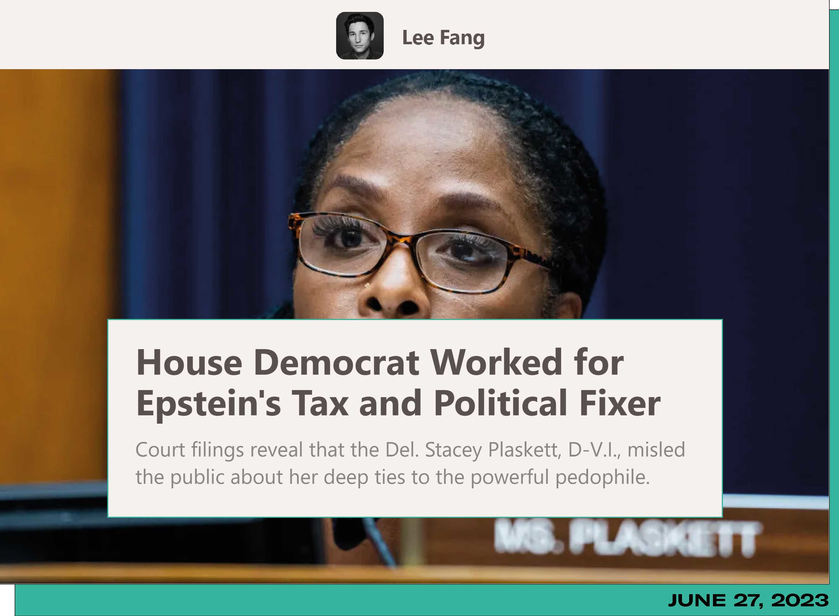
Lee Fang: Well, this revelation came from an ongoing litigation between JPMorgan and the Virgin Islands government. Both parties accused one another of facilitating and enabling Jeffrey Epstein's criminal enterprise of human trafficking, of aiding and abetting and abusing young women. In some of these latest filings from JPMorgan, actually, they show that Jeffrey Epstein controlled a very powerful political machine within the Virgin Islands. He donated to and gave various enticements to local officials in the Virgin Islands so that he would basically accomplish a few things: 1) to silence critics; 2) he also wanted a special carve-out from the Sex Offender Law so he could travel in and out of the Virgin Islands without any disclosure requirements and 3) he was looking for massive tax subsidies. He received basically $300 million in special tax exemptions for his business which he seemed to lie about. He claimed that he had a biotech startup, but there's no evidence of that.
Those documents show that one of his biggest allies in the Virgin Islands was actually Stacey Plaskett. Plaskett, when she was running for office, in 2014, was running in the Democratic primary against a major Epstein critic, [Epstein’s] closest advisers, told him, hey, you know, we've got to intervene in this primary. We got to silence this person who's been publicly criticizing you. We've got to get Stacey Plaskett in. She's an ally. I should note that Stacey Plaskett has basically defended government censorship and discussed the supposed evils of misinformation and disinformation. She's gotten some critical facts wrong here. When she was asked by the Virgin Islands affiliate of NPR if she was aware of any of these connections to Jeffrey Epstein, you know, her many donations that she received from Epstein, she said, no, she didn't know about them. She learned about them in the media. Well, these documents from the litigation tell a very different story. She actually met Epstein early when she was running for office. She solicited him many times directly for his campaign. Epstein donated not just directly to her, but to a Democratic Party affiliate of her campaign. And then later, late in Epstein's life, just not long before he was arrested for the second time and brought to New York, Stacey Plaskett went to Epstein's house in New York, met with him, and asked for a $30,000 donation to the Democratic Central Committee for House Democrats. And that's a very large donation that's a special contribution to a party committee. So, she was meeting with him in the Virgin Islands, meeting with him in person, constantly soliciting him. And what may be one of the biggest revelations from these documents is how she gets connected to the Epstein kind of political machinery. Well, before she ran for Congress, something that she scrubbed from her LinkedIn, she worked for Jeffrey Epstein's closest tax account and political fixer, someone named Erika Kellerhals, who is still the attorney for Epstein's estate. That was her job working for Jeffrey Epstein's personal lobbyist and tax accountant. That's who Stacey Plaskett worked for before she ran. So, she has deep and intimate ties, not just to Jeffrey Epstein, but to his small and kind of insular team of lawyers and tax accountants.
G. Greenwald: So as somebody who has worked with Lee as a colleague for many years and who has been familiar with his journalism for many years before that, I want to hasten to add that there's nothing Lee ever says that isn't substantiated by all sorts of documentation which you can go and read because he furnishes that documentation. That's what his reporting always is: based on documents he honors.
And this is a very kind of straightforward description of what it is that we can reveal so that under close up on his Substack, it's from June 27 and so everything that he just described about these connections between Stacey Plaskett, on the one hand, Jeffrey Epstein on the other, the intervention she did to help him be able to travel more easily despite his sex crime history and the like, their financial ties are all visible through the documents that Lee obtained and then published.
Well, let me ask you about another part of the reporting you've been doing about Jeffrey Epstein. From some of these emails that emerged from the litigation central to Jeffrey Epstein's financing was JPMorgan Chase, they have, I think, had been sued many times by his victims, and there have been internal reports about some of the reckless things they did in providing funds to him or staying connected to him. And one of the obvious questions that people have always wondered about, and I don't think we've ever really gotten an answer to, is it's very easy in the United States. Not necessarily easy, but not that hard to get very rich. But the level of wealth that Jeffrey Epstein had wasn't just rich. I mean, the fact that he was able to do things like travel on private planes and buy men's private islands and build everything he built there and own multi-story townhouses in the most expensive real estate in Manhattan and then in West Palm Beach as well, was a level of wealth that never really has been explained. I mean, he did have connections to a couple of billionaires who really seemed to value whatever he was providing them, and certainly, a lot of it came from there. But there's always been the question of whether he had connections to any particular nation-states. Of course, there have been suspicions about his connection to the U.S. security state, to Israeli intelligence, whether his involvement with a lot of powerful people enabled him a kind of blackmail that was valuable to this government. None of that has ever been proven. But you did unearth an email that suggests that he had specific ties between one of the most important people at JPMorgan Chase and also a former Israeli prime minister. What did that email demonstrate there?
Lee Fang: Well, in a new batch of emails that were released this week in this ongoing litigation, it really shows in greater detail why JPMorgan had this close relationship with Epstein. It seems very clear from these emails that Epstein was a fixer. He generated income for his associates and potentially for himself by connecting high-level people. In this particular email that you're highlighting, he's connecting JPMorgan executives, potentially even Jamie Dimon, although we don't know if the meeting took place, with Ehud Barak, the former prime minister of Israel. There are other emails showing attempted connections to Bibi Netanyahu, the former and now current prime minister of Israel. But really, it's fascinating because you look at this balance sheet that was actually disclosed this week and it shows that the private banker assigned to Epstein was the most profitable private banker in their kind of upper echelons of private bankers at JPMorgan, because, in part, Epstein was a connector. He connected these private, high net worth value bankers to people like Bill Gates, to Sergey Brin, the co-founder of Google. He facilitated high-level meetings with famous journalists like David Gergen, other kinds of celebrities and other political VIPs. By connecting people, he appeared to be generating revenue for financial institutions like JPMorgan, which wanted the business of these billionaires and very wealthy individuals. So, the wealth – and we still don't have the full picture of how Epstein generated his wealth – there are, I think, very kind of serious allegations that he used blackmail and other forms of pressure to extract donations or revenue from certain wealthy individuals. We still don't know the full picture of that. But what these documents from JPMorgan do show is that he was basically an incredible source of referring business to the bank. Bankers like James Stanley, who eventually became CEO of Barclays Bank, but when he was at JPMorgan, it was this banker, Mr. Stanley [who] was assigned directly to Epstein, and he used Epstein to bring in these billionaires and high net worth value clients into JPMorgan.
G. Greenwald: Let me ask you, Lee, and again, I really encourage people to go look at some of these connections between Jeffrey Epstein and a lot of powerful people. I sometimes dislike the reactionary attempt to immediately assume that anybody connected to Jeffrey Epstein is participating in his pedophile ring. There are a lot of other reasons to be connected to Jeffrey Epstein. Besides that, he, as we said, had a ton of money, and was able to facilitate connections. At the very least, though, everybody knew about this conviction for cavorting with underage girls, and it didn't really seem to bother really anybody in the highest levels of power as he continued to be able to move in these circles with incredible ease. And I still think there's a lot we haven't learned, on purpose, about exactly who it was that Epstein influenced, who helped him, who financed him, who received favors from him because it's in so many people's interests and so many institutions’ interests to keep those connections hidden. So, his reporting on that is really worth taking a look at.
